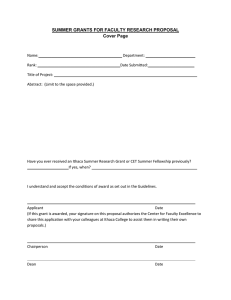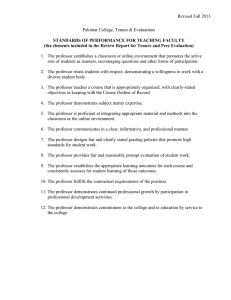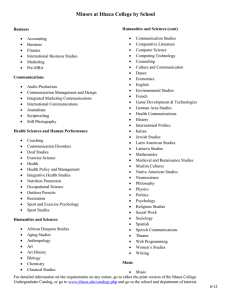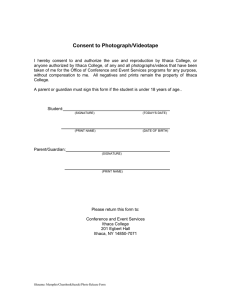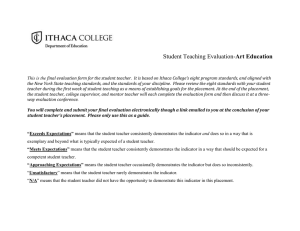Download Social Studies Eval Form
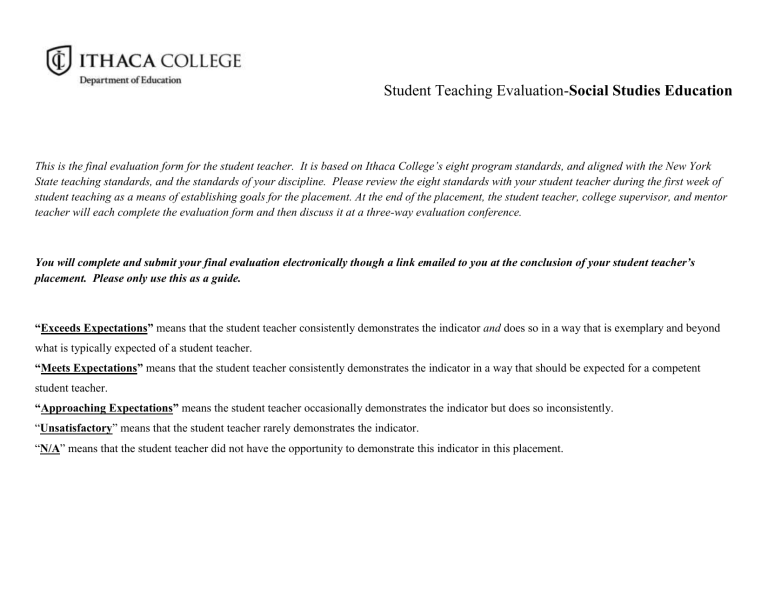
Student Teaching EvaluationSocial Studies Education
This is the final evaluation form for the student teacher. It is based on Ithaca College’s eight program standards, and aligned with the New York
State teaching standards, and the standards of your discipline. Please review the eight standards with your student teacher during the first week of student teaching as a means of establishing goals for the placement. At the end of the placement, the student teacher, college supervisor, and mentor teacher will each complete the evaluation form and then discuss it at a three-way evaluation conference.
You will complete and submit your final evaluation electronically though a link emailed to you at the conclusion of your student teacher’s placement. Please only use this as a guide.
“Exceeds Expectations” means that the student teacher consistently demonstrates the indicator and does so in a way that is exemplary and beyond what is typically expected of a student teacher.
“Meets Expectations” means that the student teacher consistently demonstrates the indicator in a way that should be expected for a competent student teacher.
“Approaching Expectations”
means the student teacher occasionally demonstrates the indicator but does so inconsistently.
“
Unsatisfactory
” means that the student teacher rarely demonstrates the indicator.
“
N/A
” means that the student teacher did not have the opportunity to demonstrate this indicator in this placement.
NCSS
Standards
NY State
Teaching
Standards
(by element)
Standard 1. Content Knowledge: This Ithaca College teaching professional demonstrates a rich, thorough understanding of the content and skill knowledge, theories, and issues that comprise the discipline.
2.1
2.1
2.1
2.4
2.3
1.1
1.2
1.3
1.4
(NY State
Content
Standard 1)
(NY State
Content
Standard 2)
(NY State
Content
Standard 3)
(NY State
Content
Standard 4)
(NY State
Content
Standard 5)
History of the United States and New York: Use a variety of intellectual skills to demonstrate their understanding of major ideas, eras, themes, developments, and turning points in the history of the
United States and New York
World History: Use a variety of intellectual skills to demonstrate their understanding of major ideas, eras, themes, developments, and turning points in world history and examine the broad sweep of history from a variety of perspectives.
Geography: Use a variety of intellectual skills to demonstrate their understanding of the geography of the interdependent world in which we live—local, national, and global—including the distribution of people, places, and environments over the Earth’s surface.
Economics: Use a variety of intellectual skills to demonstrate their understanding of how the
United States and other societies develop economic systems and associated institutions to allocate scarce resources, how major decision-making units function in the U.S. and other national economies, and how an economy solves the scarcity problem through market and nonmarket mechanisms.
Civics, Citizenship, and Government: Use a variety of intellectual skills to demonstrate their understanding of the necessity for establishing governments; the governmental system of the U.S. and other nations; the U.S. Constitution; the basic civic values of American constitutional democracy; and the roles, rights, and responsibilities of citizenship, including avenues of participation.
Culture and Cultural Diversity. Understand the basic scholarly concepts of anthropology and history
Time, Continuity, and Change. Be familiar with the history of the United States, western civilization, and non-western society
People, Places, and Environments. Understand the basic scholarly concepts of geography
Individual Development and Identity. Understand the basic scholarly concepts of psychology
1.5
1.6
1.7
1.8
Individuals, Groups, and Institutions. Understand the basic scholarly concepts of sociology and history
Power, Authority, and Governance. Understand the basic scholarly concepts of political science and history
Production, Distribution, and Consumption. Understand the basic concepts of micro- and macroeconomics
Science, Technology, and Society. Understand the manner by which science and technology have enhanced or threatened the development of human society in history
1.9
1.10
Comments
II.1
Global Connections. Understand that our planet has been exposed to an ever-increasing human interdependence in a world made smaller by improvements in communication, transportation, and trade throughout history
Civic Ideals and Practices. Understand the basic concepts of citizenship in a democratic society today and throughout history
Overall I would rate this Ithaca College teaching professional’s performance on Standard 1-
Content Knowledge as:
NCSS
Standards
NY State
Teaching
Standards
(by element)
Standard 2. Planning and Instruction/Implementation: This Ithaca College teaching professional is able to plan and implement effective, developmentally appropriate lessons and curricula based upon sound principles of content knowledge and skill development.
III.2
I.3
II.4
III.3
II.3; III.4
I.4
II.6
III.6
III.3
III.6
Completes a set of thoughtfully-developed lesson plans for the following week in time for advance review by the mentor teacher
Maintains a well-organized notebook of instructional plans, handouts, and assessments
Communicates clearly, accurately, and effectively with students
Uses knowledge of students’ strengths, needs, development, and prior knowledge in the planning process
Selects instructional goals and objectives based on local, state, and/or national social studies standards
Designs and implements lessons that are coherent, well-organized, and carefully paced and include appropriate introductions, transitions, and closures.
Designs and implements lessons that are challenging and meaningful
Uses a variety of instructional models and methods
Acquires knowledge of individual students from students, families, guardians, and/or caregivers in order to plan for student learning.
Demonstrates knowledge of the wide variety of available social studies curricula and teaching materials; selects or develops materials appropriately
Plans for questions that encourage participation and support social studies thinking
Allows sufficient wait-time after asking questions; responds appropriately to student questions
Focuses on students’ understanding and ways of thinking about social studies
Adjusts and adapts instruction mid-lesson, based on observed assessment of student learning
I.3
III.5
Tries to anticipate possible student misunderstandings and/or alternate ways of thinking
Plans lessons that help students develop collaboration and communication skills
I.6 Demonstrates an awareness of content/information literacy and uses this awareness to plan appropriate instruction and assessment
Uses appropriate primary and secondary sources for learning social studies
Demonstrates the ability to lead classes in historical and social science interpretation and analysis
Uses varied instructional strategies to facilitate students’ critical thinking, problem solving, and performance skills
Overall I would rate this Ithaca College teaching professional’s performance on Standard 2-
Planning & Instruction/Implementation as:
Comments:
NCSS
Standards
NY State
Teaching
Standards
(by element)
Standard 3. Positive Learning Environment: This Ithaca College teaching professional creates safe and motivational learning environments that encourage all students to become actively involved.
IV.1 Establishes a classroom atmosphere in which students feel comfortable making contributions and sharing their ideas
III.1; IV.2 Develops and implements research-based instruction that engages, excites, and intellectually challenges learners about social studies
Demonstrates the ability to lead classes in developing in-depth conceptual understanding of social studies
Demonstrates the ability to help students develop and test generalizations in social studies
Provides constructive, positive feedback to students
I.1 Demonstrates knowledge of child and adolescent development and applies this knowledge in support of student learning
Provides clear directions for activities and assignments IV.3
IV.4
IV.3
Plans for efficient transitions between activities or portions of the lesson
Establishes and adheres to clear classroom rules, expectations, and procedures
IV.3 Responds efficiently and effectively to classroom management problems when they do occur
IV.1
IV.4
Knows students’ names, backgrounds, interests, and strengths; makes instructional connections with learners and their interests
Establishes and maintains firm expectations for the use of appropriate, respectful language
Arranges the physical classroom environment in a way that is conducive to learning and is safe
Uses physical resources (blackboards, bulletin boards, displays, etc.) to support the learning of social studies
Encourages active inquiry, collaboration, and supportive classroom interaction by using appropriate verbal, nonverbal, and media communication
Demonstrates flexibility and responsiveness
Overall I would rate this Ithaca College teaching professional’s performance on Standard 3-
Positive Learning Environment as:
Comments:
1.1
NCSS
Standards
NY State
Teaching
Standards
(by element)
Standard 4. Diversity: This Ithaca College teaching professional respects and possesses knowledge of diversity in its many forms and knows how to use this competence to develop relationships, instruction, schools, classrooms, communities and experiences that help all students achieve to their fullest potential and function effectively and respectfully in a diverse world.
III.3
II.4
I.5
I.3
I.2
Establishes a classroom atmosphere of high expectations and worthwhile opportunities for all
Accommodates differences to help everyone learn social studies
Attempts to differentiate instruction to meet the needs of all students
Demonstrates cultural sensitivity and culturally-responsive pedagogy
Builds on the students’ diverse experiences and perspectives to enrich instruction
Accommodates students with identified special needs
Provides support for English language learners; demonstrates knowledge of language acquisition theories and processes
Overall I would rate this Ithaca College teaching professional’s performance on Standard 4-
Diversity as:
Comments:
NCSS
Standards
1.8
NY State
Teaching
Standards
(by element)
Standard 5. Technology: This Ithaca College teaching professional is able to effectively utilize technology to enhance student learning and professional growth and development.
III.5
II.3
VII.4
I.6
Uses technology appropriately to enhance social studies learning
Uses technology appropriately to support effective social studies teaching
Utilizes technology to maintain accurate records
Uses technology to enhance social studies knowledge and professional development
Demonstrates knowledge and understanding of technological and information literacy and its effect on student learning
Overall I would rate this Ithaca College teaching professional’s performance on Standard 5-
Technology as:
Comments:
NCSS
Standards
NY State
Teaching
Standards
(by element)
Standard 6. Assessment: This Ithaca College teaching professional demonstrates the ability to develop and utilize a variety of assessment tools and techniques designed to evaluate student learning and performance, provide feedback, and shape future lesson planning, programs, and curricula.
V.2
V.4
V.1
V.1
V.3
V.5
V.2
V.2
Aligns assessment to instructional goals and objectives for social studies learning
Uses assessment to enhance students’ learning of social studies
Plans for both formative and summative assessment
Plans for both formal and informal assessment
Provides specific, timely, and meaningful feedback to students
Provides information to help students understand the format of assessments and the criteria by which they will be evaluated
Uses knowledge of student skills and understanding to develop curriculum and plan instruction
Uses assessment information to self-reflect on teaching effectiveness
Overall I would rate this Ithaca College teaching professional’s performance on Standard 6-
Assessment as:
Comments:
NCSS
Standards
NY State
Teaching
Standards
(by element)
Standard 7. Collaboration and Outreach: This Ithaca College teaching professional fosters positive relationships with a variety of target groups (students, families, colleagues, local community members, etc.) in order to promote and enhance the teaching and learning environment.
VI.2
Establishes a positive relationship with students
Establishes a positive relationship and collaborates effectively with mentor teacher
VI.2
VI.2
VI.4
VI.1
VI.5
VI.4
VI.3
Establishes a positive relationship and collaborates effectively with department/team members
Establishes a positive relationship and collaborates effectively with college faculty/supervisors
Attends department, team, school, and district meetings
Upholds professional standards of practice and policy as related to students’ rights and teachers’ responsibilities.
Understands and complies with relevant laws and policies as related to students’ rights and teachers’ responsibilities
Participates fully in the life of the school; attends and assists with school activities and events
Communicates and collaborates with students’ families appropriately
Overall I would rate this Ithaca College teaching professional’s performance on Standard 7-
Collaboration & Outreach as:
Comments:
NCSS
Standards
NY State
Teaching
Standards
(by element)
Standard 8. Professional Development: This Ithaca College teaching professional engages in reflective practice and continually seeks to improve his/her knowledge base and effectiveness as a teacher, make positive contributions to the culture of his/her field, and demonstrate the dispositions of an emerging professional.
VII.3
VII.1
VII.3
VII.2
VII.4
Actively seeks feedback on and suggestions for teaching effectiveness
Responds openly and positively to feedback and suggestions
Demonstrates the ability to self-reflect and analyze teaching effectiveness
Completes thoughtful, well-written weekly reflections, as required
Participates in professional organizations and uses their resources
Participates in school, district, state, and/or national professional development activities
Continues to develop and deepen knowledge of research in content area(s) and in pedagogy
Demonstrates professionalism (see IC’s list of professional dispositions and behaviors)
Overall I would rate this Ithaca College teaching professional’s performance on Standard 8-
Professional Development as:
Comments:
